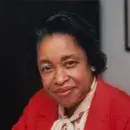
Margaret Abigail Walker
Margaret Abigail Walker was a poet, novelist, critic, and a leading figure of the literary movement known as the Chicago Black Renaissance.
Born in Birmingham, Alabama, and raised there and in New Orleans, she was educated at New Orleans (now Dillard) University, Northwestern University (B.A. in English, 1935), and the University of Iowa (M.A. in creative writing, 1940; Ph.D. in English, 1965). At age fifteen, she showed a few of her poems to Langston Hughes, who recognized her talent and encouraged her to continue writing. In 1936, she began work with the Federal Writers’ Project in Chicago, developed a close friendship with Richard Wright, and joined his Southside Writers Group, eventually taking over as group leader.
Walker’s first collection of poetry, For My People (1942), won the Yale Series of Younger Poets Award, making her the first Black woman to receive this prestigious award. She joined the faculty at Jackson College (now Jackson State University), a historically Black college, and taught there from 1949 to 1979. Her first novel, Jubilee (1966), has been described as “the first truly historical black American novel” and also the first work by a Black writer to speak out for the liberation of Black women. Based on the life of Walker’s maternal great-grandmother, Jubilee chronicles the progress of a slave family from the mid- to late nineteenth century.
In 1968, Walker founded the Institute for the Study of History, Life, and Culture of Black People (now the Margaret Walker Center) at Jackson State–one of the first Black Studies centers in the nation–and became its first director. At the forefront of a nascent Black Studies movement, Walker organized several conferences that were the first of their kind, including the 1971 National Evaluative Conference on Black Studies and a celebration of Phillis Wheatley’s bicentennial in 1973.
She was the author of the poetry collections This Is My Century: New and Collected Poems (1989), October Journey (1973), and Prophets for a New Day (1970). Her work also includes On Being Female, Black, and Free (1997), a collection of personal essays, and Richard Wright: Daemonic Genius (1988), a critical biography informed by her friendship with Wright.